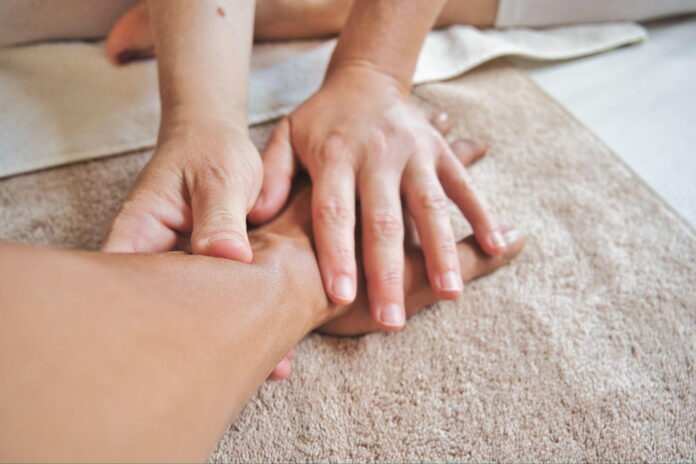Patients enrolled in physiotherapy sessions learn to overcome movement impairments caused by disease or injury, including elderly individuals experiencing pain and balance issues, infants born with developmental disabilities, as well as individuals living with heart or lung issues.
Athletes frequently turn to physiotherapy to manage injuries associated with the physical demands of their sport and manage long-term chronic health conditions like asthma or cystic fibrosis.
What is physiotherapy?
Physiotherapists (sometimes referred to as physical therapists) are health care professionals who use movement and manual therapy techniques to promote health for people of all ages. Their specialty lies in helping injured or ill individuals regain independence by relieving pain, restoring function and providing education and advice.
Physiotherapists will ask questions about your medical history before performing a physical examination to examine the affected area, range of motion, strength and flexibility assessments as well as taking any X-rays or diagnostic tests before beginning treatment.
Physiotherapists employ massage, heat therapy and exercises to relieve pain. Additionally, they can teach techniques for you to manage your condition at home as well as suggest other treatments such as electrical stimulation – which uses small electrical currents to dull pain and promote healing – acupuncture (using needles to stimulate nervous systems), braces or crutches as aids for recovery as well as advice about maintaining an active and healthy lifestyle.

What are the benefits of physiotherapy?
Physiotherapy can not only treat injuries, but can also aid in maintaining good health and wellness. This form of therapy requires extensive knowledge about how the body operates as well as using medically proven processes for assessment & treatment of patients.
Physiotherapy can be invaluable, whether you are an athlete seeking to boost physical performance or recovering from an unexpected health crisis. Furthermore, it can provide invaluable relief against aging effects as well as prevent chronic diseases like cardiovascular disease and osteoporosis. You can learn more about osteoporosis by clicking the link.
Physiotherapy’s benefits are numerous and can include relieving or eliminating pain, improving balance and stability while preventing falls, restoring functional movements, increasing flexibility and mobility, decreasing stress levels and helping you avoid surgery or medications that have negative side-effects.
Furthermore, regular sessions of physiotherapy could reduce or even eliminate surgery altogether while decreasing dependency on medicines that could potentially have negative side-effects.
Physiotherapy can also help improve sleep, ease digestive issues and increase lung capacity. An experienced therapist like the ones at Metrotown massage will teach simple yet effective exercises you can perform at home or the gym to treat your condition more cost-effectively than visiting your physician for multiple appointments, buying medication and paying for tests. This is a holistic approach to treatment that many people find beneficial.
How does physiotherapy work?
Studies have demonstrated physiotherapy’s effectiveness at increasing strength and mobility while helping manage long-term health conditions such as asthma and cystic fibrosis. Furthermore, physiotherapy encourages involvement in recovery through education, manual therapy and advice services.
Studies show the effectiveness of physiotherapy for treating musculoskeletal issues such as injuries to the back, neck, knees, ankles, wrists and shoulders. In addition, many of these injuries can be avoided with guidance from an experienced therapist.
At your first appointment, your physiotherapist will gather a thorough history and perform a physical examination in order to understand the source of your injury. They will discuss treatment options available and create an action plan moving forward together.
What are the common symptoms that physiotherapy can help address?
Musculoskeletal Physiotherapy treats injuries or symptoms related to muscles, bones and joints. This form of therapy includes manual therapy (hands-on treatment), exercise prescription and pain management strategies.
Neurological Physiotherapy provides individuals of all ages suffering from neurological problems, such as cerebral palsy and stroke, relief. You can click the link: https://www.cdc.gov/ncbddd/cp/ to learn more about cerebral palsy. Specifically, symptoms like muscle weakness and stiffness; balance and coordination issues; vision or speech impairments may all be addressed by this form of therapy.
Vestibular physiotherapy can provide relief for symptoms of dizziness or vertigo by targeting the structures within your inner ear that regulate movement and balance. A program of head and neck exercises designed by your physiotherapist may help alleviate these issues by retraining your central nervous system to compensate for an inner ear issue.
Physiotherapy can also treat sports-related injuries such as tennis elbow and golfer’s elbow. These painful conditions result from overextended tendons connecting muscles to bones; with regular sessions of physiotherapy treatment you can reduce symptoms quickly so as to return quickly to playing sports.
There are many different things physiotherapy can help remedy. Be sure to work with a reputable practitioner for best results.
Read Also
- The Role of Ingredients in Your Skincare: What to Look ForSkincare works best when you understand what goes into the products you use daily. Ingredients form the foundation of every formula and determine how the skin reacts over time. Each cream, cleanser, or serum has its own role, determined by its ingredients. Learning what to look for helps you pick products that help skin and… Read more: The Role of Ingredients in Your Skincare: What to Look For
- Your Guide to Finding a Trusted DentistChoosing the right dentist in Sandgate or your area is crucial for maintaining good oral health and achieving a confident smile. With countless dental practices to choose from, patients may find the task daunting. Data from the American Dental Association indicates that there are over 200,000 practicing dentists in the United States, highlighting the importance… Read more: Your Guide to Finding a Trusted Dentist
- Achieving a Defined, Balanced Facial Contour in SingaporeA well-defined jawline and a gently tapered lower face — commonly referred to as a V-shaped face — is a look many people aspire to. In Singapore’s beauty and aesthetic scene, treatments that help refine facial contours have grown in popularity as more individuals seek subtle, natural enhancements that boost confidence and balance facial features.… Read more: Achieving a Defined, Balanced Facial Contour in Singapore
- The Wellness Blueprint: How Your DNA Holds the AnswerGenetic testing is revolutionizing preventive healthcare by offering insights into individual health risks. By analyzing DNA, these tests provide a personalized health blueprint that can guide lifestyle and medical decisions. This approach, often referred to as DNA wellness testing, helps to optimize health naturally and prevent potential diseases. In recent years, genetic testing has become… Read more: The Wellness Blueprint: How Your DNA Holds the Answer
- Exploring the Benefits of Infusion Therapy in OKC: The Ultimate GuideUnderstanding Infusion Therapy: A Deep Dive into Its Purpose and Process What exactly is Infusion Therapy? Infusion therapy is an advanced medical treatment that delivers medication and nutrients directly into the bloodstream through a vein, typically via an IV (intravenous) line. This method is particularly beneficial for patients who require a concentrated dose of medication,… Read more: Exploring the Benefits of Infusion Therapy in OKC: The Ultimate Guide






